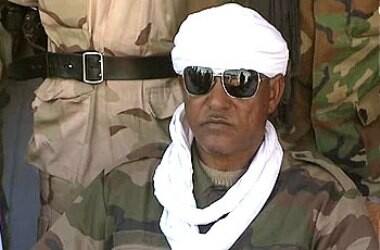The tribal leader of the Mahamid Rizeigat Arab tribe of Darfur, Musa Hilal, on Monday, announced his alignment with the Sudanese Armed Forces (SAF) and state institutions and urged his followers not to join the war on the side of the Rapid Support Forces (RSF) which he accused of being “mere militias” comprised of mercenaries.
Hilal, also a militia leader, hails from a different section of the same tribe as the RSF chief Mohamed Hamdan Dagalo, and the two have been longtime rivals in Darfur.
Speaking before his followers at his stronghold in the Mustariha area in North Darfur, Hilal told his supporters to be nationalistic.
“I want a true national stance from you, I want you to stand with Sudan and support it. Do not be among those who stab Sudan in the back,” he commanded. “From here, we declare that we stand with the political, sovereign, and economic institutions, and at the forefront is SAF.”
He added that they support SAF and not any militias, expressing his desire for Sudan to regain its natural position as a country based on sound economic foundations.
In a widely circulated video among Sudanese in the last two days, Hilal accused the RSF of using mercenaries from Chad, Ethiopia, Libya, Niger, and other countries in their ongoing war against SAF. Referring to those he described as mercenaries, Hilal said: “We are not with them and we are not among them.”
The tribal leader told his supporters to stand strong with the nation and called for a ceasefire.
“It is the duty of righteous citizens not to accept the invasion of the country,” Hilal stated.
Reacting to Hilal’s statements, a Sudanese political analyst, Muotaz Al-Amin, told Radio Tamazuj that the tribal leader’s move is linked to their rivalry with the RSF leader.
“Hilal’s recent stance cannot be separated from the historical events between him and Hemedti (Gen. Dagalo) which culminated in the arrest of Hilal by the RSF leader in 2017 after he opposed the government at the time,” he explained.
Al-Amin also linked the conflict over local leadership in the joint border areas to the conflict over state resources and privileges, considering Dagalo a newly emerging force seeking to consolidate his position in the region.
“The step has many dimensions related to political and social conflicts and conflicts within the same group,” he clarified.
Al-Amin ruled out any future understandings between the two men due to the nature of the conflict between them.
Relatedly, a security expert, Khalid Obeid Allah, told this publication that Hilal’s alignment with the Army is natural considering that he is one of the elders and sheiks in the Darfur region.
“It is not surprising that Hilal is one of the few men who stood firm in the battle for dignity,” he said. “He is now returning to the right path.”
According to Obeid Allah, the alignment of Hilal’s supporters with the ranks of SAF was expected and would affect the balance of power in the battle in Darfur. He said Hilal’s joining and supporting SAF is an indication that RSF is weakening every day and losing the gains they made before the war erupted on 15 April.
Hilal who was accused of committing atrocities in Darfur by human rights groups has been in detention until his release by the Sudanese Sovereignty Council in 2021.
Sources told this publication that Hilal’s release happened after a reconciliation agreement between him and the then Vice-President of the Sovereignty Council, Gen. Mohamed Hamdan Dagalo, which included financial compensation provided to Hilal for the losses he suffered during his imprisonment and his dispute with the government of Gen. Omar Al-Bashir, which was overthrown by the December revolution.




